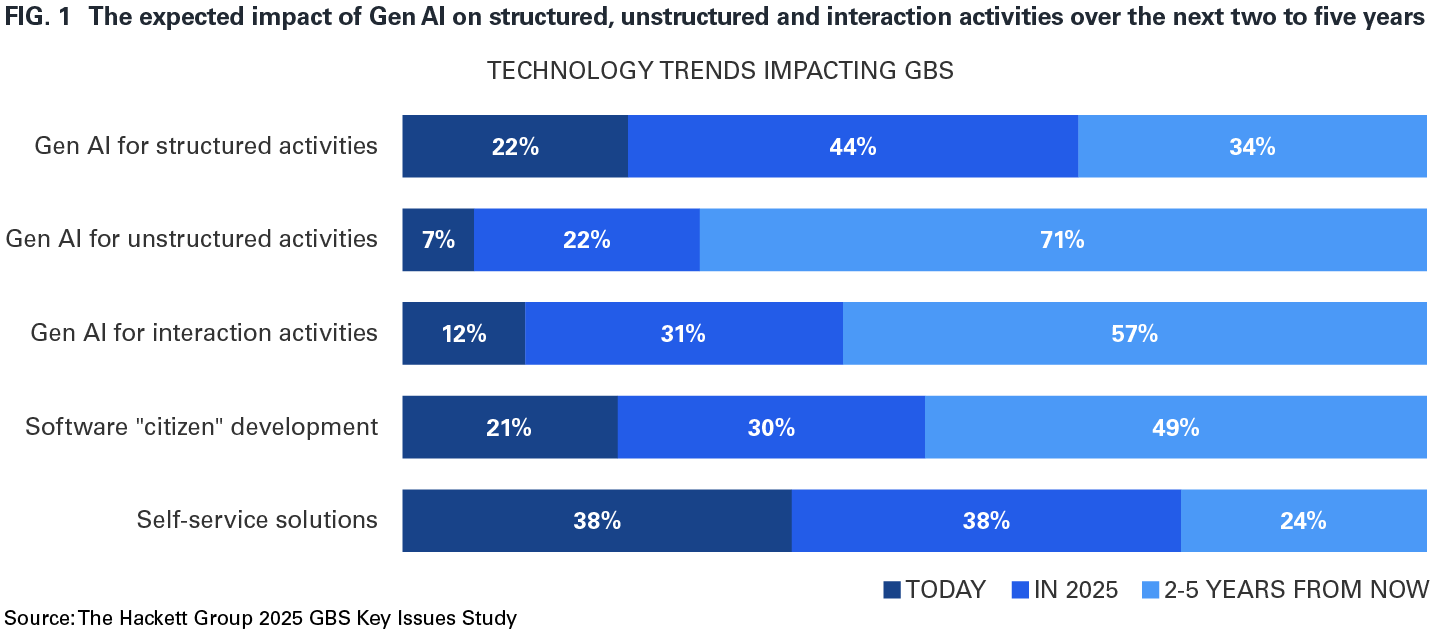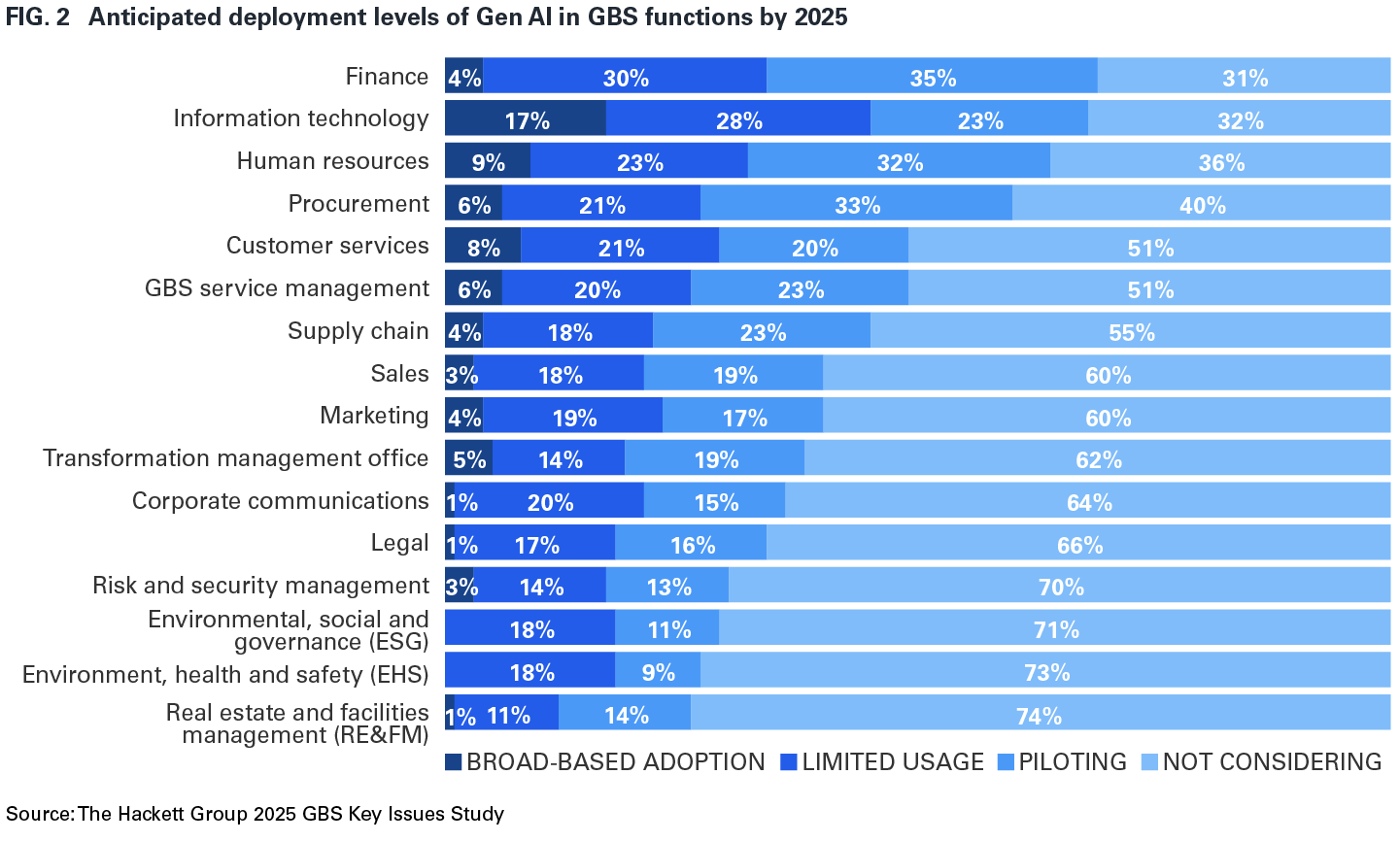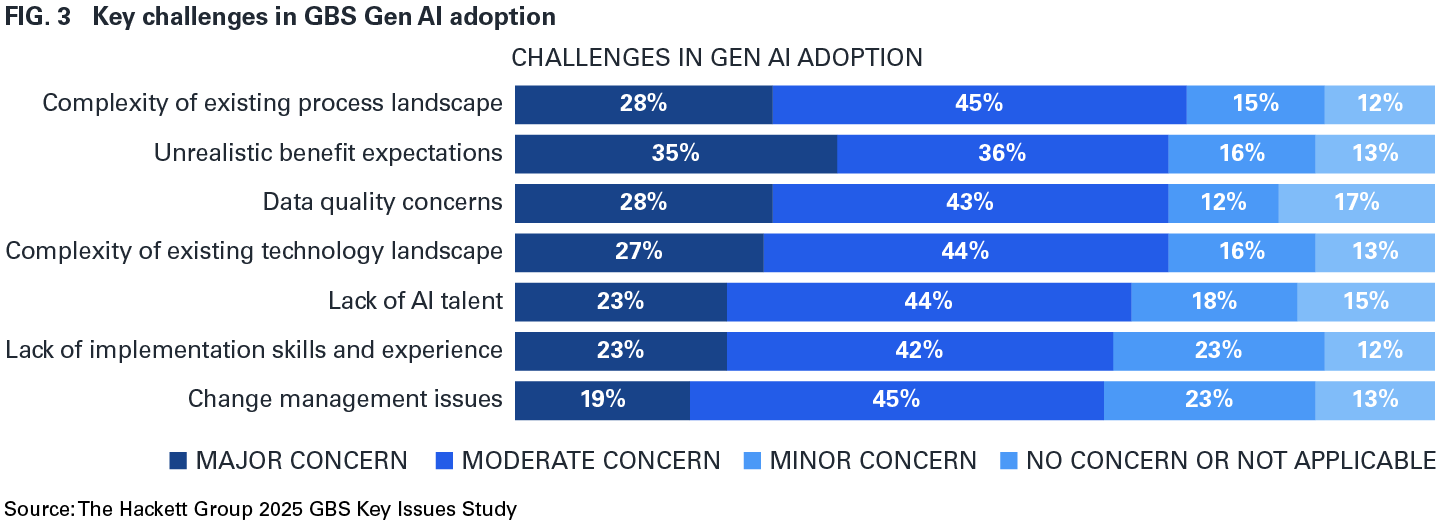Gen AI Accelerates: How Businesses Are Scaling AI for Competitive Advantage in 2025
In just one year, generative artificial intelligence (Gen AI) has evolved from an area of exploration to a business imperative. Organizations are no longer just testing the waters – they are aggressively scaling Gen AI to reimagine performance, drive efficiency and secure a competitive edge.
The Hackett Group’s 2025 Enterprise Key Issues Study underscores this transformation: 89% of executives report advancing Gen AI initiatives, a stark contrast to 2024, when just 16% reported prioritizing business transformation through AI. As organizations recognize Gen AI’s potential, they are accelerating projects to achieve key goals such as improving customer satisfaction (56%), innovating products (47%) and reducing costs (46%).
GBS organizations are leading the charge in Gen AI adoption
With the enterprise-spanning impact and reach of GBS organizations, they stand to play a key role as a vanguard of Gen AI adoption. GBS leaders were among the first to realize the transformative power that Gen AI offers to revolutionize how work is done, elevate customer interactions and secure a competitive advantage. As early adopters, they were on average more active and ambitious in exploring the potential of Gen AI to augment performance across the board.
The Hackett Group 2025 GBS Key Issues Study found that more than two-thirds of GBS leaders polled in late 2024 reported that they were piloting Gen AI or exploring select use cases. And just under two-thirds of that group reported that their Gen AI initiatives were meeting or exceeding their expectations. And the outlook for 2025 and beyond is even more ambitious, as GBS leaders expect aggressive expansion in the use of Gen AI across structured activities, unstructured activities, interaction activities and self-service solutions (Fig. 1).

The rise of AI assistants and agents
As Gen AI adoption has expanded, two AI-powered solutions in particular have emerged as game changers: AI assistants and AI agents.
Defining Al
Assistants: Intelligent applications that understand natural language and use conversational interfaces to complete tasks on behalf of users.
Agents: Intelligent applications that perform tasks autonomously on behalf of users or other systems without the need for constant human intervention.
Together these tools are poised to revolutionize operations by enhancing efficiency, reducing manual errors and providing real-time insights that enable more agile decision-making.
Global business services (GBS) organizations that have not yet integrated these AI-powered tools into their operations are at a competitive disadvantage. Many GBS organizations in 2024 invested in understanding how Gen AI works – 42% piloted Gen AI use cases, while 26% explored limited applications. The results were promising – 63% of GBS organizations reported that their Gen AI initiatives met or exceeded expectations, delivering tangible benefits such as lower operating costs, higher productivity, improved quality and enhanced customer and employee experiences.
The expanding role of Gen AI in GBS organizations
The study highlights a clear trend: by 2025, GBS leaders expect broad-based Gen AI adoption across multiple business functions, including finance, IT, human resources, procurement, customer service and supply chain management (Fig. 2).

GBS organizations are integrating Gen AI into their strategic objectives in three key ways:
Increasing service penetration: 47% of organizations plan to expand their services in 2025, with AI playing a critical role in scaling operations across business units and geographies.
Achieving cost leadership: 60% of executives see AI as central to meeting cost goals, with automation (64%) and continuous improvement (55%) playing vital roles.
Elevating value creation: 70% of GBS organizations prioritize spend management, while 69% focus on working capital management – both of which are increasingly AI-driven.
Overcoming challenges in Gen AI adoption
While the benefits of Gen AI are clear, organizations must navigate several challenges to maximize their AI investments (Fig. 3).
Key roadblocks include:
- Process complexity (73%): Integrating AI into complex workflows can be daunting.
- Unrealistic expectations (71%): Many organizations need to set clear, measurable goals for Gen AI.
- Data quality and technology limitations (71%): AI success depends on high-quality data and robust infrastructure.
- Lack of AI talent (67%): Finding skilled professionals in AI and data science remains a challenge.
- Implementation gaps (65%): Many businesses struggle with execution due to limited AI expertise.

GBS leaders are learning valuable lessons not only from their successes in pioneering Gen AI adoption within their organizations, but also from the challenges and obstacles they’ve encountered. These pain points have helped focus GBS decision-making and planning on developing strategies for overcoming and moving past these challenges. Those strategies will pave the way forward in 2025 and beyond.
Strategic actions for success in 2025
To maximize the impact of Gen AI, businesses must focus on key action areas:
- Embrace co-intelligence for rapid implementation: Gen AI should be integrated as a tool for co-intelligence, leveraging AI to enhance human decision-making rather than replace it. Organizations must move beyond pilots and scale AI solutions enterprise-wide.
- Set realistic expectations: Businesses should quantify AI’s value beyond cost savings, incorporating metrics for quality, customer experience and productivity.
- Reskill and upskill the workforce: AI adoption is not just about technology – it’s about people. Companies must invest in training and retention strategies to build AI-ready teams.
- Enhance data management capabilities: AI-driven decision-making requires robust data governance and real-time insights.
- Strengthen cybersecurity measures: As AI adoption accelerates, businesses must align cybersecurity investments with digital transformation strategies.
- Adopt a technology-enabled operating model: Whether through a platform-centric or aggregator model, organizations must create an integrated AI-driven ecosystem for service delivery.
- Build AI centers of excellence (COEs): Centralized AI expertise can drive decision-making, implementation and effective AI governance, ensuring organizations overcome technical and change management challenges.
Gen AI: It’s time to reimagine work
The rapid rise of Gen AI is reshaping business strategies, operational efficiencies and competitive landscapes. Organizations that embrace AI today will gain a significant edge, while those that hesitate risk being left behind. Although challenges exist, a structured approach to Gen AI adoption – one that integrates AI into core business strategies – will enable companies to unlock breakthrough value. Beyond that, organizations must be ready to reimagine their work, workforce, performance and competitive advantage as they scale with Gen AI. They must determine the role Gen AI will play in key functions and tasks: when will AI assist and augment human efforts, and when will it work autonomously in an organization’s processes?
GBS organizations are uniquely well-positioned to explore these questions and find the practical answers and solutions – solutions that will benefit and provide leadership to the entire enterprise.
Businesses that prioritize AI innovation, invest in workforce readiness and build scalable AI frameworks will lead the next wave of digital transformation. And as the use of Gen AI becomes a competitive necessity across the landscape of every business and industry, the most successful enterprises will almost certainly be those in which GBS has taken a key role in navigating that transformation.
Are you ready to scale Gen AI and unlock its full potential?
It’s time to act. Contact us for more information or to schedule a demonstration.




